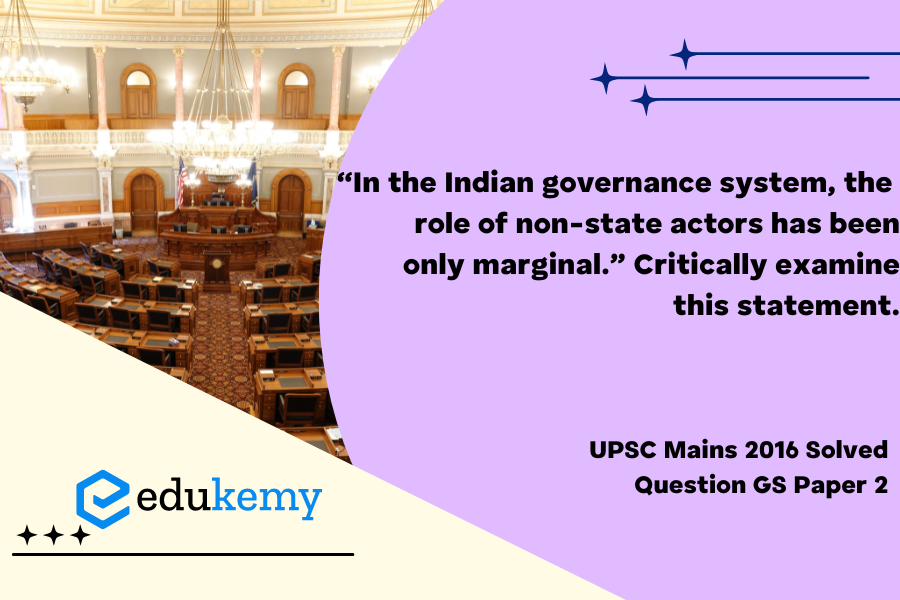In the complex tapestry of the Indian governance system, the involvement of non-state actors has traditionally been viewed as peripheral. The predominant perception suggests that the state, with its bureaucracy and elected representatives, occupies the central stage in decision-making and policy implementation. However, a critical examination of this assertion unveils a nuanced reality. While the formal structure of governance may indeed be state-centric, the influence and participation of non-state actors are increasingly palpable across various domains. Civil society organizations, grassroots movements, and corporate entities exert considerable influence, challenging the conventional narrative of a marginal role. Civil society organizations often play a pivotal role in advocacy, pushing for policy reforms and acting as watchdogs to ensure accountability. Additionally, corporate entities, through their economic prowess, wield substantial sway, influencing policy decisions and contributing to the formulation of developmental strategies. Moreover, grassroots movements have emerged as powerful agents of change, effectively shaping discourse and policy trajectories. Therefore, while the state may hold the formal reins of governance, the landscape is evolving, and the role of non-state actors is becoming more pronounced, demanding a critical reevaluation of the perceived marginality in the Indian governance paradigm.
Tag: Government policies and interventions for development in various sectors and issues arising out of their design and implementation.
Contents
Decoding the Question:
- In the Introduction, write briefly about non-state actors.
- In Body,
- Discuss the role of non-state actors in the governance system.
- Mention various limitations and challenges for non-state actors.
- In Conclusion, try to mention the overall importance of non-state actors and suggest measures to address issues.
Answer:
Non-state actors refer to a wide range of development actors – other than government. In practice, it means that participation is open to all kinds of actors, such as the private sector, community-based organizations, women’s groups, human rights associations, non-governmental organizations (NGOs), religious organizations, farmers’ cooperatives, trade unions, universities and research institutes, the media, etc.
Non-state actors have been widely recognized as an essential ‘third’ sector. Its strength can have a positive influence on the state and the market Nonstate actors are therefore seen as an increasingly important agent for promoting good governance like transparency, effectiveness, openness, responsiveness, and accountability.

Role of Non-state Actors in Governance System:
- Non-state actors have come to play an important role in the process of governance in India. Today, non-state actors are actively engaged in community mobilization, economic development, and societal transformation.
- They play different roles like capacity building, asset creation, representation, lobbying, advocacy, service delivery, etc.
- Essentially, they are instruments of people’s action and the means of protecting and promoting the vital rights of citizens.
- They carry on social reforms and fight against the evils of society and are instruments of people’s actions and the means of protecting and promoting the vital rights of citizens.
- In policy formation, awareness generation, policy execution, etc., the role of non-state actors is important due to their understanding of ground realities.
- They also check the political abuses of power and violations of laws and provide a voice to unheard vulnerable sections.
- They also promote democratic attributes amongst citizens like tolerance, willingness to compromise, and respect for conflicting views.
Limited Role of Non-state actors:
- At the same time, their contribution to the governance domain is limited by lack of funds, inadequate trained personnel, lack of culture of volunteering, etc.
- The multiplicity of laws and regulations adds to their problems. This prevents the non-state actors from reaching their full potential in enforcing good governance.
- Considering that India has over 2 million registered NGOs, the scope and extent of their contribution have been below par.
Non-state actors have come to exert an increased influence on the management, decision-making, and working of government. They generate awareness among people put pressure on the government, and help in achieving and maintaining a high degree of transparency and accountability in governance. However, the role of these organizations is limited due to various issues; thus the government should realize the seamless sharing of ideas and resources across various institutions and encourage their participation in the governance system at different levels.
In case you still have your doubts, contact us on 9811333901.
For UPSC Prelims Resources, Click here
For Daily Updates and Study Material:
Join our Telegram Channel – Edukemy for IAS
- 1. Learn through Videos – here
- 2. Be Exam Ready by Practicing Daily MCQs – here
- 3. Daily Newsletter – Get all your Current Affairs Covered – here
- 4. Mains Answer Writing Practice – here


